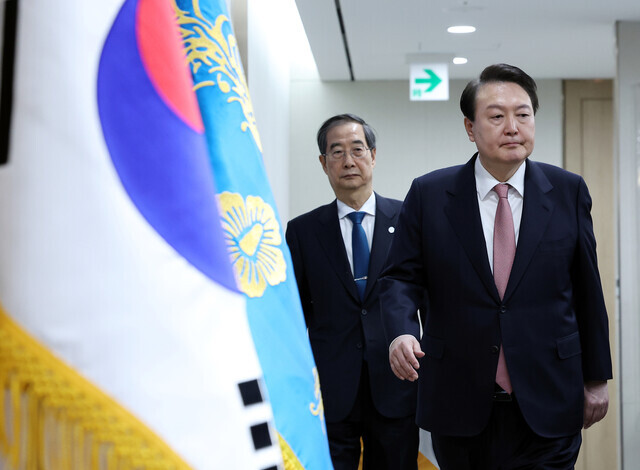hankyoreh
Links to other country sites 다른 나라 사이트 링크
Yoon’s defense of Tokyo summit criticized as twisting history to fit his needs

South Korean President Yoon Suk-yeol’s lengthy televised remarks about his summit with Japan during a Cabinet meeting on Tuesday have provoked fierce backlash. Experts said that the domestic and foreign examples Yoon marshaled in support of his foreign policy approach toward Japan seem crudely cobbled together, without the logical consistency they would need.
The Hankyoreh’s investigation on Wednesday called into question Yoon’s claim during the Cabinet meeting that “under the basic relations and claims treaties that Korea and Japan reached in 1965, the Korean government received aid from Japan on behalf of all Koreans’ individual right to make claims.” Yoon was explaining the government’s plan to pay damages to the victims of forced labor during the Japanese colonial period on behalf of the Japanese perpetrator companies.
Kim Chang-rok, a law professor at Kyungpook National University, explained, “There are records from the South Korea-Japan summit process indicating that Japan proposed to pay [support] directly to individual Korean victims, with Korea assuming responsibility for follow-up measures, but no such language can be found anywhere in the Treaty on Basic Relations or claims settlement agreement.”
“More importantly, compensation claims for forced mobilization are not subject to the terms of the claims settlement agreement, as the Korean Supreme Court clearly stated in its 2018 decision,” he added.
“He’s jumbled together two completely unrelated things,” he concluded.
Yoon also missed the point when talking about how then-Chinese Premier Zhou Enlai “abandoned demands of compensation for the war” when establishing diplomatic ties with Japan.
Yang Kee-ho, a professor of Japanese studies at Sungkonghoe University, explained, “While China did give up claims of compensation against the Japanese government, stating that it could ‘not put a price on the blood shed by victims of the war,’ it received enormous amounts of loans in yen over the three decades or so after diplomatic relations were established.”
China also did not forfeit the right for individuals to claim compensation. Chinese forced labor mobilization victims who filed a suit against Japan’s Nishimatsu Construction to claim damages ended up losing their case before the Supreme Court of Japan. But when the Chinese government sternly protested and anti-Japanese sentiment began stirring in China, the company made a direct apology and provided a reconciliation payment to the victims.
Critics further said that Yoon’s use of Germany and France’s reconciliation as an example when talking about the “need to move beyond the past” also showed an ignorance of the reality between South Korea and Japan. In their view, Germany’s approach of addressing the legacy of Naziism based on thorough reflection cannot be equated with Japan’s attitude of routinely denying the illegality of its colonization practices, even when it does express apologies or remorse.
Former South Korean Ambassador to Japan Lee Su-hoon said, “President Yoon talked about how he intended to carry on the [1998] declaration by [South Korean President] Kim Dae-jung and [Japanese Prime Minister] Keizo Obuchi, but the core of that statement centered on establishing a future-oriented South Korea-Japan relationship based on Japan confronting its past, acknowledging its responsibility, and apologizing.”
“It is absurd to talk about ‘carrying on’ that declaration when they’re dismantling the ‘confronting its past’ aspect that is so central to it,” he stressed.
By Jung In-hwan, staff reporter; Shin Hyeong-cheol, staff reporter
Please direct questions or comments to [english@hani.co.kr]

Editorial・opinion
![[Editorial] Penalties for airing allegations against Korea’s first lady endanger free press [Editorial] Penalties for airing allegations against Korea’s first lady endanger free press](https://flexible.img.hani.co.kr/flexible/normal/500/300/imgdb/original/2024/0502/1817146398095106.jpg) [Editorial] Penalties for airing allegations against Korea’s first lady endanger free press
[Editorial] Penalties for airing allegations against Korea’s first lady endanger free press![[Editorial] Yoon must halt procurement of SM-3 interceptor missiles [Editorial] Yoon must halt procurement of SM-3 interceptor missiles](https://flexible.img.hani.co.kr/flexible/normal/500/300/imgdb/child/2024/0501/17145495551605_1717145495195344.jpg) [Editorial] Yoon must halt procurement of SM-3 interceptor missiles
[Editorial] Yoon must halt procurement of SM-3 interceptor missiles- [Guest essay] Maybe Korea’s rapid population decline is an opportunity, not a crisis
- [Column] Can Yoon steer diplomacy with Russia, China back on track?
- [Column] Season 2 of special prosecutor probe may be coming to Korea soon
- [Column] Park Geun-hye déjà vu in Yoon Suk-yeol
- [Editorial] New weight of N. Korea’s nuclear threats makes dialogue all the more urgent
- [Guest essay] The real reason Korea’s new right wants to dub Rhee a founding father
- [Column] ‘Choson’: Is it time we start referring to N. Korea in its own terms?
- [Editorial] Japan’s rewriting of history with Korea has gone too far
Most viewed articles
- 160% of young Koreans see no need to have kids after marriage
- 2Presidential office warns of veto in response to opposition passing special counsel probe act
- 3[Editorial] Penalties for airing allegations against Korea’s first lady endanger free press
- 4Months and months of overdue wages are pushing migrant workers in Korea into debt
- 5Hybe-Ador dispute shines light on pervasive issues behind K-pop’s tidy facade
- 6Anti-immigration candidate marauds across Korea with squad detaining foreigners
- 7[Column] Unsettling moves by the UN Command lay way for Korean involvement in Taiwan
- 8Alleged drug use by Korean A-listers rocks nation – but not for the first time
- 91 in 3 S. Korean security experts support nuclear armament, CSIS finds
- 10[Reporter’s notebook] In Min’s world, she’s the artist — and NewJeans is her art